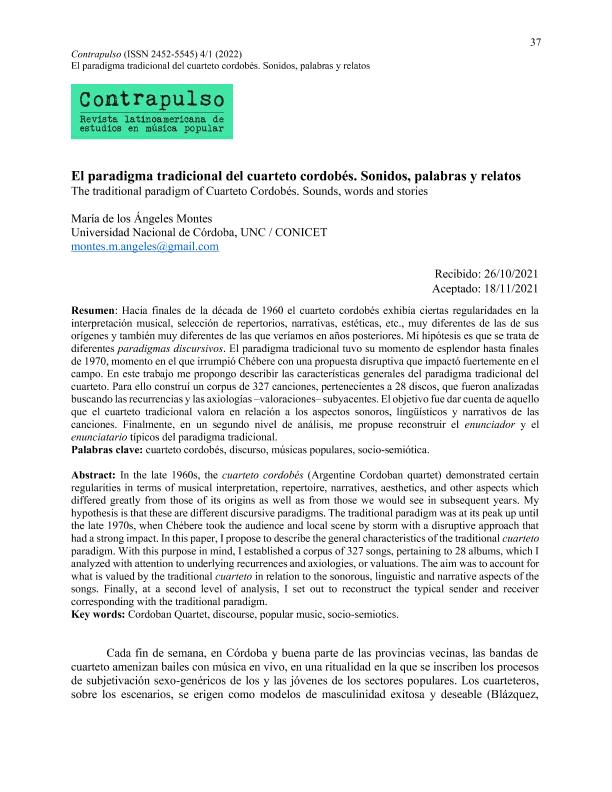Mostrar el registro sencillo del ítem
dc.contributor.author
Montes, Maria de Los Angeles

dc.date.available
2023-07-13T18:57:40Z
dc.date.issued
2022-01
dc.identifier.citation
Montes, Maria de Los Angeles; El paradigma tradicional del cuarteto cordobés: Sonidos, palabras y relatos; Universidad Alberto Hurtado. Facultad de Filosofía y Humanidades; Contrapulso; 4; 1; 1-2022; 37-53
dc.identifier.uri
http://hdl.handle.net/11336/203835
dc.description.abstract
Hacia finales de la década de 1960 el cuarteto cordobés exhibía ciertas regularidades en la interpretación musical, selección de repertorios, narrativas, estéticas, etc., muy diferentes de las de sus orígenes y también muy diferentes de las que veríamos en años posteriores. Mi hipótesis es que se trata de diferentes paradigmas discursivos. El paradigma tradicional tuvo su momento de esplendor hasta finales de 1970, momento en el que irrumpió Chébere con una propuesta disruptiva que impactó fuertemente en el campo. En este trabajo me propongo describir las características generales del paradigma tradicional del cuarteto. Para ello construí un corpus de 327 canciones, pertenecientes a 28 discos, que fueron analizadas buscando las recurrencias y las axiologías (valoraciones) subyacentes. El objetivo fue dar cuenta de aquello que el cuarteto tradicional valora en relación a los aspectos sonoros, lingüísticos y narrativos de las canciones. Finalmente, en un segundo nivel de análisis, me propuse reconstruir el enunciador y el enunciatario típicos del paradigma tradicional.
dc.description.abstract
In the late 1960s, the cuarteto cordobés (Argentine Cordoban quartet) demonstrated certain regularities in terms of musical interpretation, repertoire, narratives, aesthetics, and other aspects which differed greatly from those of its origins as well as from those we would see in subsequent years. My hypothesis is that these are different discursive paradigms. The traditional paradigm was at its peak up until the late 1970s, when Chébere took the audience and local scene by storm with a disruptive approach that had a strong impact. In this paper, I propose to describe the general characteristics of the traditional cuarteto paradigm. With this purpose in mind, I established a corpus of 327 songs, pertaining to 28 albums, which I analyzed with attention to underlying recurrences and axiologies, or valuations. The aim was to account for what is valued by the traditional cuarteto in relation to the sonorous, linguistic and narrative aspects of the songs. Finally, at a second level of analysis, I set out to reconstruct the typical sender and receiver corresponding with the traditional paradigm.
dc.format
application/pdf
dc.language.iso
spa
dc.publisher
Universidad Alberto Hurtado. Facultad de Filosofía y Humanidades
dc.rights
info:eu-repo/semantics/openAccess
dc.rights.uri
https://creativecommons.org/licenses/by-nc-sa/2.5/ar/
dc.subject
CUARTETO CORDOBES
dc.subject
MÚSICAS POPULARES
dc.subject
DISCURSO
dc.subject
SOCIOSEMIÓTICA
dc.subject.classification
Otras Humanidades

dc.subject.classification
Otras Humanidades

dc.subject.classification
HUMANIDADES

dc.title
El paradigma tradicional del cuarteto cordobés: Sonidos, palabras y relatos
dc.title
The traditional paradigm of Cuarteto Cordobés: Sounds, words and stories
dc.type
info:eu-repo/semantics/article
dc.type
info:ar-repo/semantics/artículo
dc.type
info:eu-repo/semantics/publishedVersion
dc.date.updated
2023-06-30T10:59:59Z
dc.identifier.eissn
2452-5545
dc.journal.volume
4
dc.journal.number
1
dc.journal.pagination
37-53
dc.journal.pais
Chile

dc.journal.ciudad
Santiago de Chile
dc.description.fil
Fil: Montes, Maria de Los Angeles. Consejo Nacional de Investigaciones Científicas y Técnicas. Centro Científico Tecnológico Conicet - Córdoba. Instituto de Humanidades. Universidad Nacional de Córdoba. Instituto de Humanidades; Argentina
dc.journal.title
Contrapulso
dc.relation.alternativeid
info:eu-repo/semantics/altIdentifier/url/https://contrapulso.uahurtado.cl/index.php/cp/article/view/140
dc.relation.alternativeid
info:eu-repo/semantics/altIdentifier/doi/http://dx.doi.org/10.53689/cp.v4i1.140
Archivos asociados
